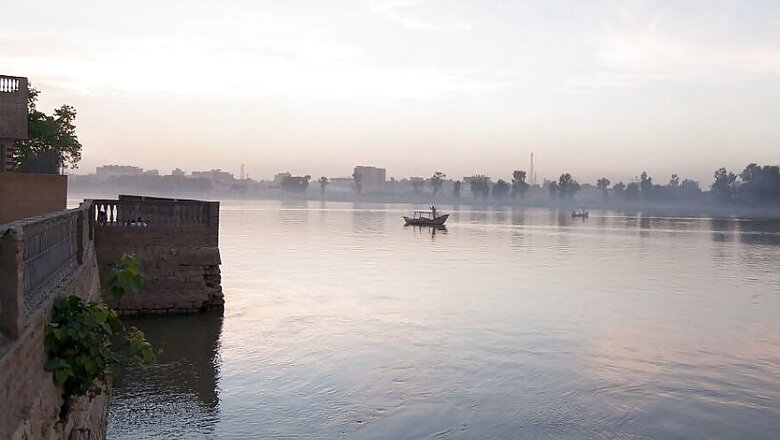
views
New Delhi: Weighing its options to hit back at Pakistan for sponsoring terror, India has decided to revisit the 56-year-old Indus Waters Treaty as Prime Minister Narendra Modi on Monday bluntly said that "blood and water cannot flow together".
Using water as a weapon, the government has decided there would no meeting of the Permanent Indus Commission set up to overlook implementation of the treaty till "terror is in the air", and that India would also take a final call on the unilateral part of suspension of the Tulbul water navigation project in Jammu and Kashmir depending on what Pakistan did next.
The two major steps as well as maximising the flow into India of river waters -- used by Pakistan -- were decided upon at a meeting of senior officials chaired by Prime Minister Narendra Modi here.
The meeting decided that an inter-ministerial commission would be set up to look into various provisions of the bilateral water treaty that was signed in Karachi on September 19,1960, out of Pakistan's fear that since the source of rivers of the Indus basin is in India, it could potentially create droughts and famines in Pakistan during times of war.
"Blood and water cannot flow together," official sources here quoted Modi as having said during the meeting.
The meeting was attended, among others, by National Security Advisor Ajit Doval, Foreign Secretary S. Jaishankar, Water Resources Secretary Shashi Shekhar and Principal Secretary to Prime Minister Nripendra Mishra.
The meeting decided to look at the full utilisation of the waters of the Indus, Chenab and Jhelum, the three western rivers of the Indus water system that flow through Jammu and Kashmir to Pakistan.
Around 95 percent of the waters of the three eastern rivers of Sutlej, Beas and Ravi is ustilised by India.
Signed after 10 years of discussions, the Indus Waters Treaty was designed to generate goodwill between the two South Asian neighbours and has survived three wars.
The meeting, according to sources, decided that with things being "rather difficult" with Pakistan in the past few weeks, India should revisit the treaty.
It was also decided that there would be no meeting of the Permanent Indus Commission, till Pakistan stopped sponsoring terrorism against India. The commission has held 112 meetings till now at an average of two a year.
According to sources, the government will look into reviving work on the Tulbul water navigation project on the mouth of the Wular Lake in Jammu and Kshmir.
Work on the project was suspended in 1987 after Pakistan objected to it, saying it violated the provisions of the Indus Waters Treaty.
The inter-ministerial commission that will be set up will be tasked with reaping maximum benefits from the Indus water system for farmers.
At present 9.12 lakh hectares of land has been harvested with these waters in India, the sources said and added that there was potential to harvest eight lakh acres more.
Though India as of now has no storage facilities for these waters, the government is now looking at the full utilisation of the 3.6 million acre feet of water it is entitled to.
The meeting also decided to look at the possibility of generating the full potential of 18,000 MW of power from these rivers.
As of now, India is generating only 3,034 MW. Projects are under construction for generating 2,526 MW, while projects for generating 5,046 MW are at an advanced stage of approval.
The Salal hydroelectric project was constructed on the Chenab river.
The Pakal Dul hydroelectric project on the Marusadar river, a tributary of the Chenab, is under construction in Kishtwar district of Jammu and Kashmir, while the Bursar project on the Chenab in Kishtwar district is to be implemented by the National Hydro Power Coproration.
The sources also pointed out that the Jammu and Kashmir assembly has also voiced dissent at the Indus Waters Treaty and called for its scrapping.
Various political parties in the state are of the view that the treaty has not benefitted the people of the state, causing damage to the tune of Rs 6,000 crore to Rs 6,500 crore annually.
The decision to revisit the water treaty comes in the wake of the September 18 terror attack at the Uri army base in Jammu and Kashmir that claimed the lives of 18 soldiers. India has blamed Pakistan-based Jaish-e-Mohammed (JeM) terrorist outfit for it.
Bilateral ties have nosedived in the wake of the Uri attack and Pakistan's open backing of the unrest in Kashmir since the July 8 killing of Hizbul Mujahideen terrorist Burhan Wani, and terming him a martyr.
Monday's meeting was held a day after the BJP's national council meeting in which Modi said the government will accelerate its efforts to isolate Pakistan for "exporting terror".
The Congress said the Indus Waters Treaty was an element in the multi-pronged, multi-faceted approach against Pakistan. Party spokesperson Abhishek Manu Singhvi said it was for the government to calibrate its response and it should not start from abrogating the pact.

















Comments
0 comment